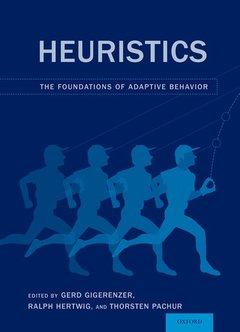Description
Heuristics
The Foundations of Adaptive Behavior
Authors: Gigerenzer Gerd, Hertwig Ralph, Pachur Thorsten
Language: English
Subject for Heuristics:
Approximative price 78.94 €
In Print (Delivery period: 21 days).
Add to cart
Publication date: 01-2016
880 p. · 18.2x25.3 cm · Paperback
880 p. · 18.2x25.3 cm · Paperback
Description
/li>Biography
/li>
How do people make decisions when time is limited, information unreliable, and the future uncertain? Based on the work of Nobel laureate Herbert Simon and with the help of colleagues around the world, the Adaptive Behavior and Cognition (ABC) Group at the Max Planck Institute for Human Development in Berlin has developed a research program on simple heuristics, also known as fast and frugal heuristics. In the social sciences, heuristics have been believed to be generally inferior to complex methods for inference, or even irrational. Although this may be true in "small worlds " where everything is known for certain, we show that in the actual world in which we live, full of uncertainties and surprises, heuristics are indispensable and often more accurate than complex methods. Contrary to a deeply entrenched belief, complex problems do not necessitate complex computations. Less can be more. Simple heuristics exploit the information structure of the environment, and thus embody ecological rather than logical rationality. Simon (1999) applauded this new program as a "revolution in cognitive science, striking a great blow for sanity in the approach to human rationality. " By providing a fresh look at how the mind works as well as the nature of rationality, the simple heuristics program has stimulated a large body of research, led to fascinating applications in diverse fields from law to medicine to business to sports, and instigated controversial debates in psychology, philosophy, and economics. In a single volume, the present reader compiles key articles that have been published in journals across many disciplines. These articles present theory, real-world applications, and a sample of the large number of existing experimental studies that provide evidence for people's adaptive use of heuristics.
Gerd Gigerenzer is Director of the Center for Adaptive Behavior and Cognition at the Max Planck Institute for Human Development in Berlin, and former Professor of Psychology at the University of Chicago. He won the AAAS Prize for the best article in the behavioral sciences and the Association of American Publishers Prize for the best book in the social and behavioral sciences. His recent books include Rationality for Mortals, Gut Feelings, and Risk Savvy . Ralph Hertwig is Director of the Center for Adaptive Rationality at the Max Planck Institute for Human Development in Berlin. His research investigates how individuals and groups juggle the simultaneous demands of uncertainty, data scarcity, and limits in cognitive resources when making decisions. He was previously Chair of Cognitive and Decision Sciences and Dean of the Faculty of Psychology at the University of Basel, and he is a recipient of the Heinz Heckhausen Young Scientist Prize.
© 2024 LAVOISIER S.A.S.
These books may interest you

Simple Heuristics in a Social World 170.88 €



